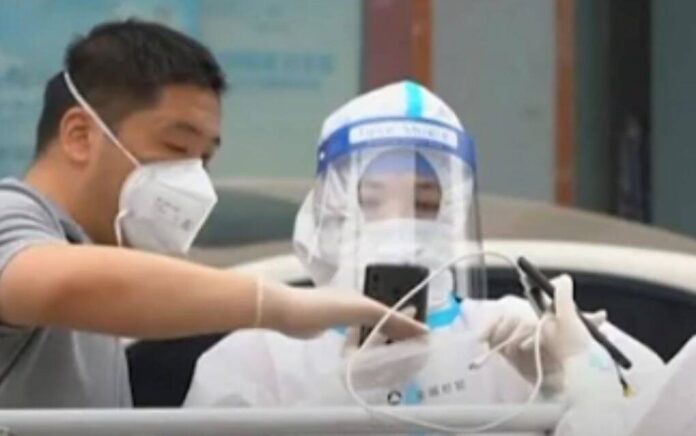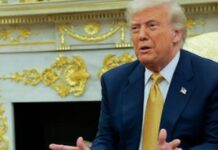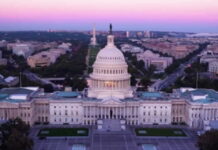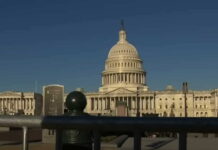
Many Americans are concerned about national security right now. They should be.
Because a foreign spy who’s defected to the U.S. has unveiled a jaw-dropping anti-American scheme brewing.
Chinese Scientists in U.S. Labs Pose Growing Security Risk, Whistleblower Warns
A Chinese doctor who fled her homeland after exposing controversial COVID-19 research claims that scientists from China working in American laboratories are systematically trained to steal intellectual property for the Chinese Communist Party (CCP), raising alarms about national security threats embedded within U.S. research institutions.
Li-Meng Yan, a Chinese-educated doctor born in Qingdao, China, asserts that Chinese scientists are bound by government contracts to pilfer U.S. research, technology, and other valuable assets for the benefit of the CCP.
“Scientists getting visa from China to the US, they are visiting scholars. They have signed the contract with Chinese government to go back to China, serve China with whatever they can get from the US,” Yan said during a recent television interview. Her statements suggest a calculated effort by the CCP to exploit U.S. openness in academic exchanges.
Yan’s claims align with recent actions by the Trump administration, which has initiated a rigorous vetting process for hundreds of foreign scientists, particularly those from China, who were granted visas with assistance from federal agencies like the National Institutes of Health (NIH). The move aims to curb potential espionage and protect sensitive research.
“That’s why they get visas from the Chinese government. So from the beginning, they have already made a deal with the CCP and become CCP’s, kind of agents,” Yan added. “So China has these people come here, grab your intellectual properties, grab your technologies, compromise your people, and that is like the tumor, like the parasites go to your body, go to your country.”
The doctor’s warnings come amid heightened scrutiny of Chinese researchers in the U.S., spurred by incidents like the recent case at the University of Michigan, where two Chinese-born scientists were charged with attempting to smuggle a toxic pathogen into the country. The episode has intensified concerns about the vulnerabilities in America’s research ecosystem.
Yunqing Jian, 33, and Zunyong Liu, 34, faced charges from the Justice Department for trying to smuggle Fusarium graminearum, a fungus deemed a “potential agroterrorism weapon” due to its ability to devastate crops like wheat, barley, maize, and rice by causing “head blight.” The researchers were working in a lab led by Chinese-born scientists Ping He and Libo Shan, who have received over $7.6 million in NIH funding for plant immunity research.
“[The] FBI have caught CCP agents pretending to be researchers smuggling the deadly fungus, and also the round worms, which can cause biosecurity threats to agriculture and humans and the animals in the U.S. through your customs,” Yan said, pointing to the broader implications of such actions for U.S. food security.
Yan argues that these incidents are part of a deliberate Chinese strategy to weaponize U.S. research capabilities. She claims the CCP views bioweapons targeting agriculture as “the poor people’s nuclear weapons,” a chilling perspective that clearly highlights the potential for catastrophic disruption to America’s food supply.
The FBI, under new leadership, has acknowledged the severity of the threat. “The CCP’s quiet infiltration of our research ecosystem is a direct threat to our national security, biosecurity, and economic independence,” said Erica Knight, an adviser to FBI Director Kash Patel. The bureau has vowed to intensify efforts to eliminate foreign influence in federally funded research.
The Trump administration’s vetting initiative, launched in recent weeks, targets as many as 1,000 scientists from “countries of concern,” with a significant focus on China. This effort marks a stark departure from the lax oversight of previous administrations, which failed to adequately screen researchers for ties to the Chinese military or the CCP.
The Government Accountability Office (GAO) has repeatedly warned about the risks of foreign influence in U.S. research, issuing over six reports in the past decade highlighting inadequate safeguards against intellectual property theft, particularly from China. A 2021 GAO report noted that U.S. research universities partnering with the NIH are especially vulnerable to such threats.
“We know that with the open border, thousands, tens of thousands, of Chinese came, most of them desperate Chinese wanting to live in a free society, but also, especially towards the end of the Biden administration, there were a lot of packs of Chinese males coming in from groups of four to 15, and we saw them with identical kit,” said Gordon Chang during the same television interview, raising concerns about broader Chinese infiltration efforts.
Chang also pointed to an “uptick in tempo of incursions and attempted incursions into our military bases, illicit surveillance of those bases, plus illicit surveillance of our infrastructure.” He warned that these networks “are ready to strike,” posing what he considers the “single greatest threat” to U.S. security.
Yan’s own journey adds context to her warnings. After fleeing China in April 2020, she claimed that COVID-19 was “produced in a laboratory” by Chinese scientists, a theory initially dismissed by the U.S. medical establishment but later supported by at least one U.S. intelligence agency.



















